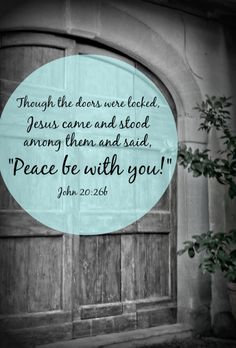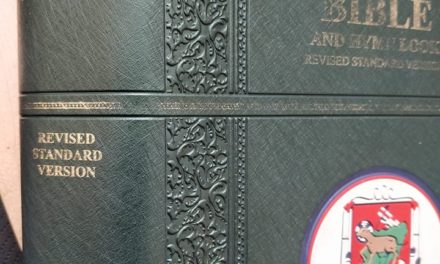Easter as part of God’s story is our story in relation to the Good News about our salvation and the Bible at the heart of this Gospel story. The Bible as entirely pre-scientific library of sixty-six story books, ‘thirty-nine of them written before the coming of Christ, twenty-seven of them after it’ summons us to step into this story books and ask what might Jesus have to say to us today?
The disciples in our gospel reading today are hiding (Jn 20:19-31). They are hiding from fear of the Jews. Are they hiding from God like Adam and Eve did in the Garden of Eden? One thing that is common to the disciples and Adam and Eve is fear. Both of them were under the lockdown of fear just as we are facing global lockdown of panic and fear. Lockdown in this context is what happens in times of crisis to prevent people from escaping or from coming in.
The disciples found themselves locked in the same room behind the same locked door as it was in the Easter night. The resurrection experience that was meant to be a Good News for positive change and breakthrough was a lockdown for them. The empty tomb make no sense or difference to them. The lesson for us today is that we should avoid the great tragedy and mistake the disciples made 2000 years ago. They refused to unlock the doors of their doubts and unbelief. They refused to open the doors of their faith in Jesus. They refused to get out of the house of fear. The question is what are the doors that the disciples failed to unlock or open? There is door of unbelief. People who hear about the resurrection for the first time may need time to belief or comprehend this amazing story. In John chapter 20, as one of the stages of belief, Peter checked out the facts and was still puzzled about what happened. While the disciples went away again into their own house, Mary, stood without at the sepulchre weeping (vv 6-11). The door of unbelief kept the disciples locked in ‘their own home,’ the same place of fear and panic whereas the resurrection news summons them to come out of their fear and unbelief just as Mary did.
The second Sunday of Easter summons us to step into this resurrection story and ask what might Jesus have to say to us today especially under the pandemic lockdown? We must be watchful not to allow fear of suffering death, infection-by-association, doubt or denial of our love for God and others. I believe, Jesus is saying to us today on the need for the Beatitudes for a lockdown world.
Under the global pandemic and lockdowm, let us remember that, it is just where you are is the place Christ shows up. Are you in the in the same house of fear behind the same locked doors like the disciples? Are you in the same sinful habit behind the same locked doors of sin? The Good News is that Jesus stands in the midst of your sinful habit. The walls and the locked doors of your sin, pride, and unbelief cannot keep Jesus out. He is risen. The tomb is empty. The price is paid. Today, Jesus is ready to step into the midst of your sinful lifestyle and breathe peace and life to you. The Good News in our lockdown is about Jesus’s breath of peace and hope. It is about Jesus’s breath of peace and courage. It is about Jesus’s breath of peace and strength into us. Jesus’s breath of peace is the key that unlock our lockdowns, fear and panic, and empowers us for mission and evangelism. The breath of God is able to change the doubting Thomases in each of us to become confessing Thomases.
Edwin Hatch (1835-1889), an authority on the early church as a result of his Bampton Lectures, in the simplicity of one of his profound hymn, ‘Breath on me, breath of God,’ points us to ‘a deep knowledge of Scripture,’ especially on John’s account of the Resurrection. Let us join Edwin in singing the hymn as we invoke the Holy Spirit to come into our lives in the face of the pandemic as a source of renewal and healing in Jesus’s name:
1 Breathe on me, Breath
of God,
fill me with life anew,
that I may love the way you love,
and do what you would do.
2 Breathe on me, Breath of God,
until my heart is pure,
until my will is one with yours,
to do and to endure.
3 Breathe on me, Breath of God,
so shall I never die,
but live with you the perfect life
for all eternity.











Recent Comments